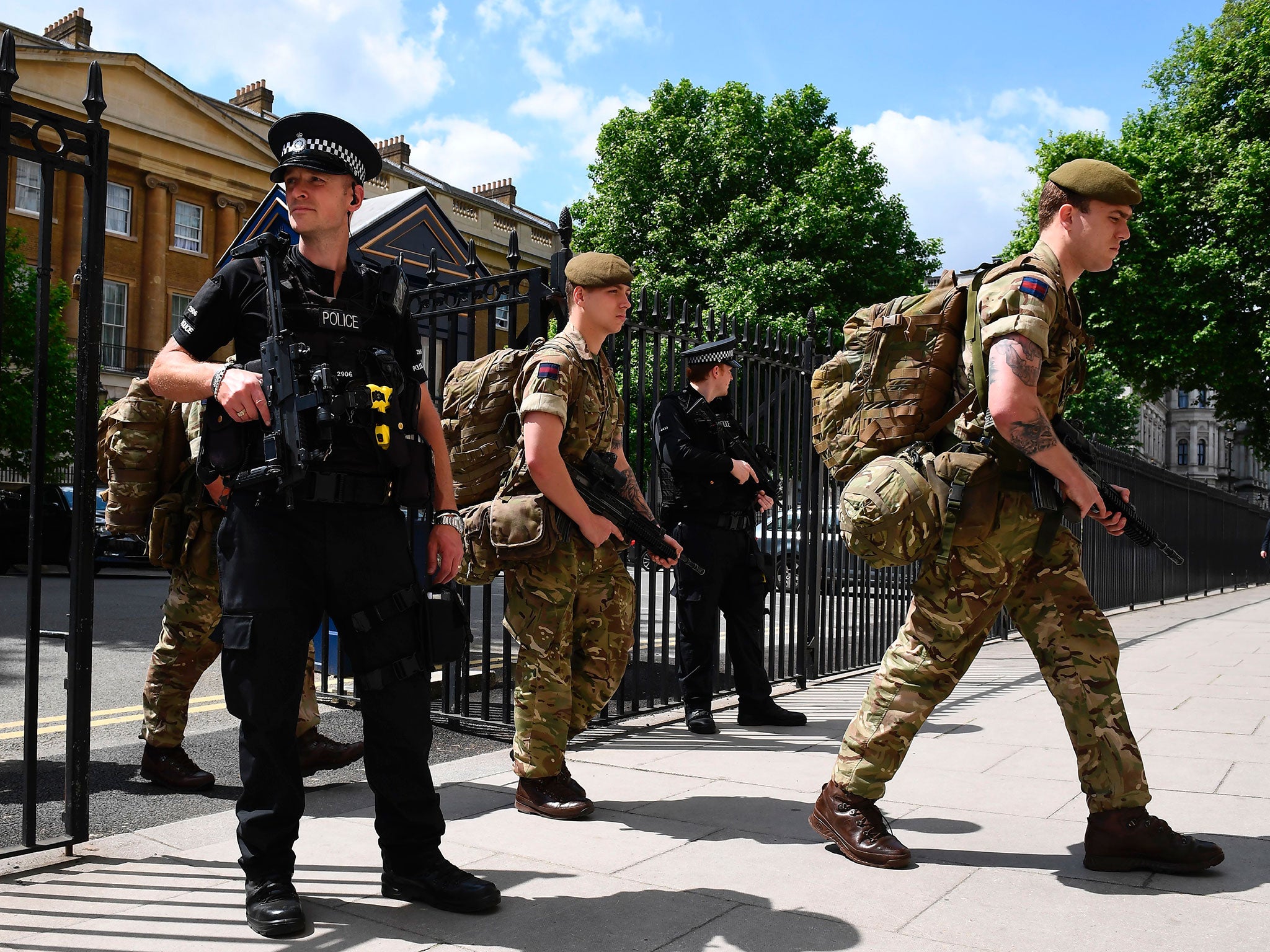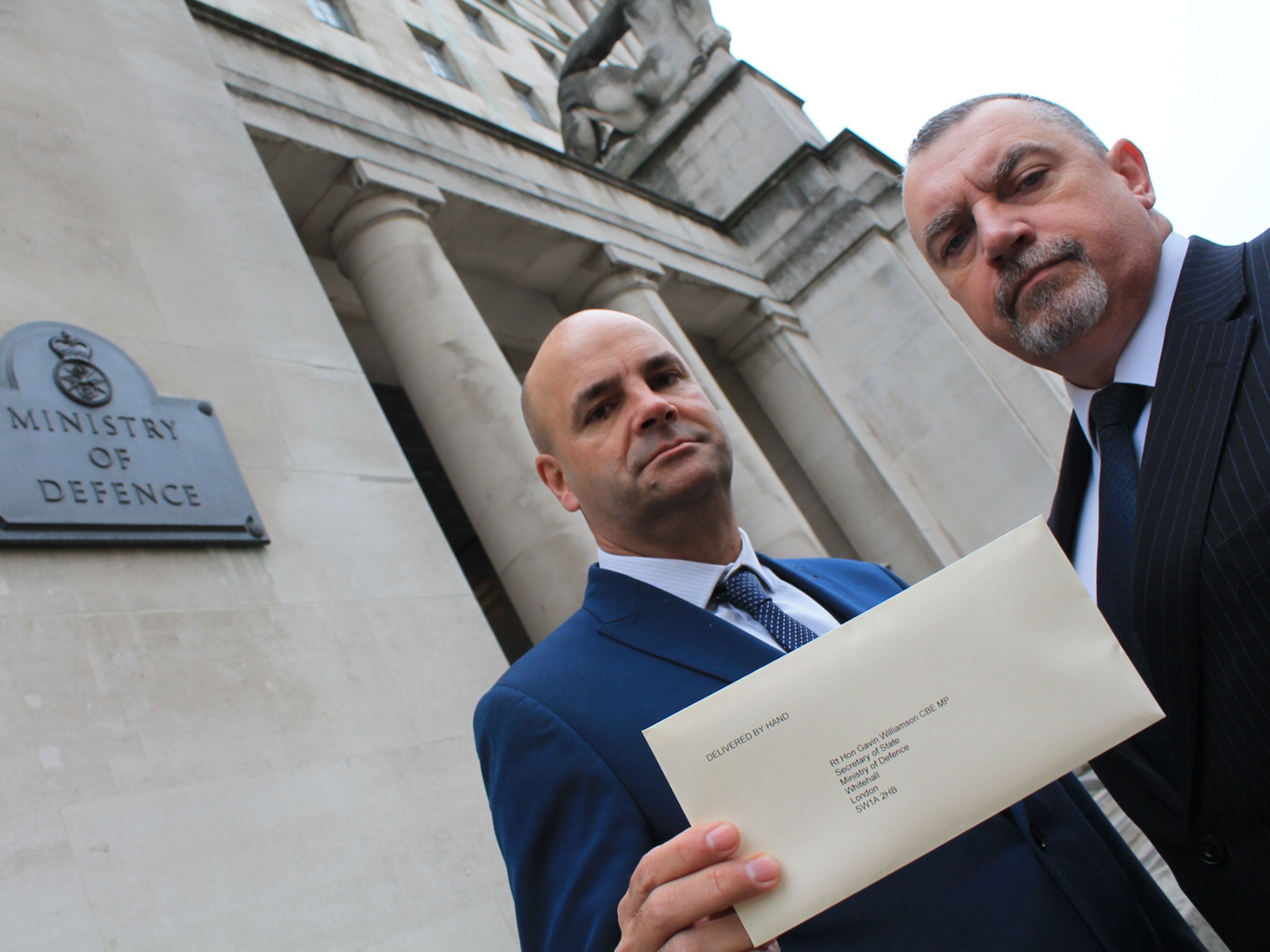UK military bases and assets 'left at unacceptable risk of terror attack by police budget cuts'
Staff association predicts up to 300 posts could be lost amid heightened threat but MoD says security is not at risk

Britain’s military bases and assets are being left at “unacceptable risk of attack” because of budget cuts, the new Defence Secretary has been warned.
In a letter to Gavin Williamson, the chairman of the Defence Police Federation said that that continued efficiencies could force armed officers to be reduced, despite the rising terror threat.
“I must highlight the deeply concerning, and in many cases deplorable decision making that is leaving many of the UK’s critical military assets and sites at unacceptable risk of attack on our own shores,” Sergeant Eamon Keating wrote.
“The tragic and cowardly terrorist attacks of the last 12 months have demonstrated not only an appetite and ability for destruction amongst those who threaten our society, but also a willingness to target our most secure locations as in the case of the attack on the Palace of Westminster.
“Yet despite this risk, decisions are being taken by MoD officials…that prioritise the pursuit of financial savings over the threat to our assets.
“It is perhaps only a matter of time before an MoD establishment in the UK faces attack, and the reality is that continued and pernicious reductions in the capacity of the MoD Police leave it ill-equipped and understaffed to deal with such a situation.”
The 2,500-strong Ministry of Defence Police (MoD Police) provide armed security protecting assets such as the Trident nuclear deterrent, munitions sites and new aircraft carriers, as well as contributing to some criminal investigations.

While the number of officers has risen over the past four years – from 2,499 in the 2014/15 financial year to 2,542 in 2017/18 – the Defence Police Federation predicts that cuts could now force a reduction of up to 13 per cent of the workforce.
“This is leaving MoD sites around the UK at serious risk, and well below agreed and acceptable levels of security and at the level of maximum risk on a daily basis,” Mr Keating wrote.
The MoD Police is the second-largest armed police contingent in the country, containing more firearms officers than every force bar the Metropolitan Police combined.
Its officers are among those released under Operation Temperer, which sees troops deployed to bolster regular police officers during periods of a critical terror threat, as seen after the Manchester attack and Parsons Green bombing.
British soldiers have been the target of several terror plots since the murder of Fusilier Lee Rigby, who was killed by two Islamists near Woolwich barracks in 2013.
An Isis supporter was jailed last year for planning an attack on RAF Lakenheath and RAF Mildenhall in Suffolk, while another group of terrorists who dubbed themselves the Three Musketeers were plotting to target the military or police.
There have also been other security breaches, including one that saw an amateur photographer land a drone on the deck of the new HMS Queen Elizabeth aircraft carrier unchallenged in August.
“I could have carried two kilos of Semtex and left it on the deck,” said the pilot, who later reported himself to armed guards in Scotland.
The most recent annual plan for the MoD police listed terror attacks at the top of its priority list, with Chief Constable Alf Hitchcock warning that the threat was expected to continue for the “foreseeable future” but budget constraints were “challenging”.
“We have achieved significant efficiency savings over the past 12 months,” he said in a foreword to the report. “There now remains little opportunity for further MoD Police cost reductions.”
The most recent annual report by the Ministry of Defence Police Committee, which provides scrutiny of its work, said reductions to overtime pay and a freeze on recruitment had caused a “downward variation of service level at some establishments”.
“If current recruitment targets are not met over the next two years, the force will struggle to maintain the capacity to deliver tasks,” it continued.
A spokesperson for the MoD said the force has sufficient staff to protect key sites and that their security would not be put at risk, with any changes subject to risk assessments and consultation.
The Government refuted the Defence Police Federation’s predictions over cuts to frontline officers, but Mr Keating insisted that up to 300 posts could be lost.
He told The Independent that the number of officers guarding some sites was being reduced from the optimum number set by safety plans to lower figures intended only for emergency scenarios.
“We’ve cut back room staff over six or seven years of budget reviews, and now all we’ve got [to reduce] is officers,” Mr Keating said.
“It seems like madness that we’re degrading security to save a few million quid on assets costing billions.
“This will only reach a crescendo when something happens and that’s were our fear comes from - the past 12 months has demonstrated that no site is invulnerable.”
Mr Keating said that although the Government has increased funding for specialist counter-terror units, many rural sites guarding by the MoD Police are “in the back of beyond” and would see a slower response times from urban forces.
His letter to the Defence Secretary came amid calls for increased funding from regular police forces, who are attempting to balance separate spending reductions amid an increase in demand from terrorism and rising recorded crime and 999 calls.
An MOD spokesperson said: “The MoD Police has enough people to meet its commitment to protecting key sites across the country. We take the safety and security of such sites very seriously and we would never put them, or the people who work within them, at risk.”